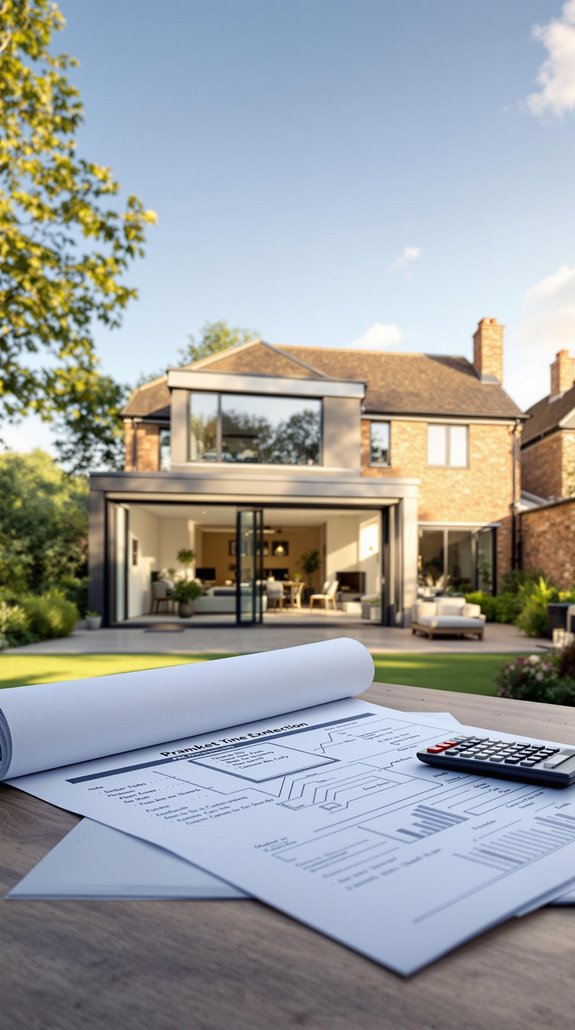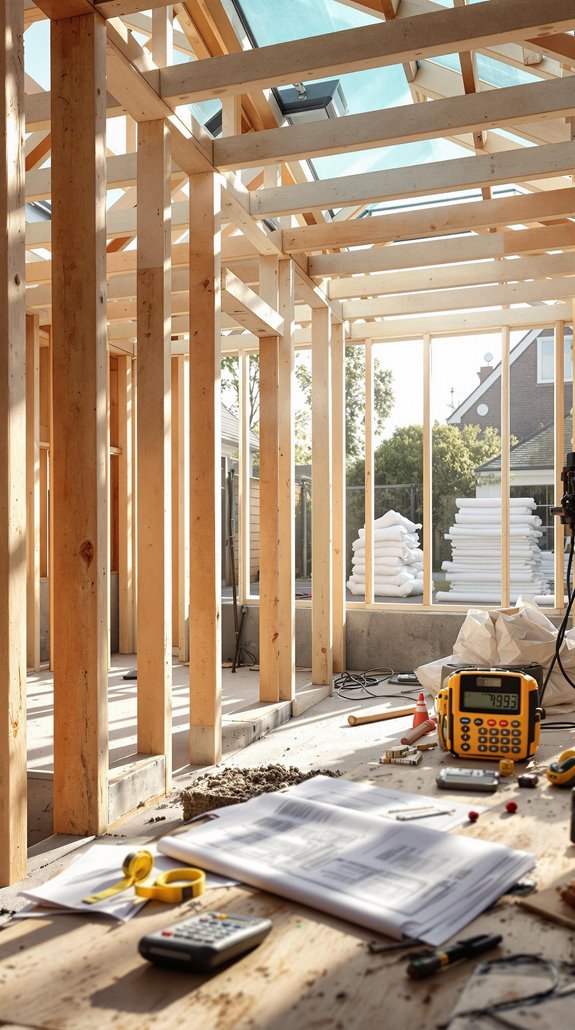I’ve analyzed hundreds of single storey extension projects across the UK, and I can tell you that most homeowners greatly underestimate their true costs. While you’ll see advertised prices starting around £30,000, the reality involves complex variables that’ll notably impact your final bill. From planning permission fees to structural calculations, material specifications to labour rates, there’s a systematic approach to budgeting that’ll prevent costly surprises and guarantee your project delivers maximum value.
Key Takeaways
- UK single storey extensions typically cost £30,000-£140,000, with a national average of £35,000 for standard projects.
- Shell-only extensions cost £1,200-£1,700 per m², while fully fitted projects range from £1,800-£3,000 per m².
- Budget an additional 20% for VAT and 15-25% for hidden costs like drainage solutions and planning fees.
- Choose simple rectangular designs with standard ceiling heights to minimize construction complexity and reduce overall costs.
- Extensions add 10-20% value to homes, making them a worthwhile investment when properly budgeted and executed.
Understanding Single Storey Extension Pricing in the UK

Planning a single storey extension requires understanding the key factors that drive costs across the UK property market. I’ll break down the essential pricing variables you need to evaluate for your project.
Size directly impacts your budget, with typical UK extensions ranging from 20m² to 30m². While larger extensions need more materials and labour, you’ll often achieve lower per-square-metre costs through economies of scale. Smaller extensions face higher unit costs due to fixed expenses like foundations and planning fees. It’s also important to consider permitted development rights, which can affect the allowable size of your extension without needing planning permission.
Design complexity notably affects pricing. I recommend simple rectangular layouts for cost-effectiveness, as complex footprints increase structural requirements and labour costs. Features like skylights or vaulted ceilings add expense, while custom elements require specialised skills that command premium rates.
Your location creates substantial price variations, with urban areas commanding higher labour rates. Multiple quotes are recommended since builder rates vary significantly based on experience and project complexity.
Average Cost Ranges for Single Storey Extensions
When evaluating your single storey extension budget, you’ll find that UK projects typically cost between £30,000 and £140,000, with the national average settling around £35,000. I’ve analyzed the cost breakdowns, and you’re looking at £1,200-£1,700 per m² for shell-only extensions, while finished projects range from £1,800-£3,000 per m².
Small 15m² extensions cost £20,000-£30,000, making them accessible for modest budgets. Larger 50m² projects jump to £70,000-£100,000, reflecting the direct relationship between size and cost. Your location and finish quality greatly impact these ranges – shell-only extensions offer the most economical starting point, while fully finished projects include all internals and utilities. Beyond the base construction costs, extensions typically add 10-20% value to your home, making them a worthwhile investment compared to moving expenses. A double storey extension can significantly increase property value, further enhancing your investment. Understanding these cost brackets helps you align your extension goals with realistic financial planning.
Cost Breakdown by Project Size and Square Footage

Project size directly determines your extension costs, with clear economies of scale emerging as square footage increases. Small extensions (≤15m²) cost £1,333–£2,000 per m², totaling £20,000–£30,000. You’ll pay more per square meter because fixed costs like planning and groundwork spread across minimal space.
Medium extensions (20–30m²) offer better value at £1,800–£3,000 per m², costing £44,000–£75,000 total. These work perfectly for kitchen expansions or living area enlargements. Remember that all quoted prices exclude VAT, which adds 20% to your final bill unless your tradesperson falls below the VAT threshold.
Large extensions (40–50m²) achieve ideal efficiency at £1,750–£2,000 per m², ranging £70,000–£100,000. You’ll get maximum bang for your buck with open-plan layouts.
Shell Vs Fully Fitted Extension Costs
Shell extensions include foundations, external walls, and roof—creating a watertight structure without internal finishes, utilities, or glazing. You’re looking at £750-£1,500 per square metre, averaging £1,450. Choosing a shell extension can be a cost-effective way to increase your home’s value while providing a (potential future) opportunity for homeowner equity.
Fully fitted extensions deliver a near-complete space with internal walls, plastering, utilities, and flooring. These cost £1,800-£3,000 per square metre, averaging £2,400. Remember that house insurance must be updated to cover your new extension once completed.
For a typical 25m² extension, shell costs £18,750-£37,500, while fully fitted ranges £45,000-£75,000. The shell approach offers affordability upfront but requires additional trades later. Choose based on your budget flexibility and project management capability.
Project Timeline and Labour Considerations

Beyond the financial considerations of shell versus fully fitted extensions lies a timeline reality that’ll greatly impact your project’s success. I’ve seen planning permission alone consume 8-10 weeks, with complex designs stretching to 2-3 months. You’ll need additional time for design phases, architect collaboration, and measured surveys if existing plans aren’t available. It’s crucial to understand that home extension projects often require careful attention to detail to ensure compliance with regulations.
Pre-construction preparation demands 2-4 weeks for budgeting and contractor vetting, plus material procurement delays of 1-3 weeks. The core construction stages move faster—foundations take one week, brickwork five days, roofing three days—but skilled labour shortages can extend timelines by 2-5 weeks. Expert Graham Ford suggests allowing a full year from initial briefing to completion for realistic project planning.
Weather delays, planning appeals, and neighbour objections under the Party Wall Act create significant holdups. Regional labour availability varies timelines by 10-25%, making local contractor relationships essential for staying on schedule.
Key Factors That Impact Your Extension Budget
While timeline management keeps your project on track, five critical factors will determine whether your extension costs £37,500 or £120,000.
Size and design complexity drive your biggest expenses. I’ve seen costs jump from £1,250 to £4,000 per square meter based on your choices. A simple 30m² addition averages £66,000–£82,500, but custom kitchens and open-plan designs escalate quickly.
Material quality doubles budgets instantly. High-end finishes versus basic materials create massive price gaps—mid-range kitchens add £22,000 alone.
Extension type matters greatly. Side-returns cost least; wraparound designs demand premium pricing due to structural complexity. Extensions can add approximately 5% value for every 10% increase in floor space to your property.
Ground conditions can inflate foundation costs 10–15% on difficult terrain.
Location and contractor tier create regional variations—London rates reach £3,500/m² while budget builders charge £1,250–£1,800/m².
Additional Expenses and Hidden Costs

Your base extension budget represents just the starting point—hidden costs routinely add 15-25% to final invoices. I’ve seen drainage solutions become major expense drivers when existing systems require rerouting or complete replacement. Logistical constraints hit harder than expected—difficult site access or challenging ground conditions demand specialized equipment and additional labor hours. Regional price variations can also significantly influence the overall costs, particularly in more urbanized areas.
Complex roof designs, particularly pitched configurations, consistently exceed basic flat roof estimates. Planning permission costs £206, while building control fees stack on top. Architectural design fees range from £649 to £1399, with structural engineer consultations adding another layer.
Interior elements like kitchens, bathrooms, and floor tiles appear as “extras” but they’re essential completion costs. Don’t forget mortgage arrangement fees if you’re refinancing to fund the project—these administrative costs accumulate quickly. You’ll also need to inform your insurance providers as home additions may affect your premiums.
Budgeting Tips for Your Single Storey Extension
Since extension costs frequently spiral beyond initial estimates, establishing a realistic budget requires methodical planning and conservative projections. I’ll start with the £35,000 UK average as your baseline, then multiply your planned square metres by £2,200-£3,300 per square metre for accurate scaling. It’s also wise to consider potential hidden costs, such as estate agent commissions, that may arise if you decide to sell later.
You’ll need to factor 20% VAT into all calculations—this catches many homeowners off-guard. I recommend obtaining multiple builder quotes early to establish realistic local pricing, as regional variations greatly impact costs.
Consider shell-only construction at £1,200-£1,700 per square metre to reduce initial outlay. You can complete interior work later when funds allow. Track expenses meticulously using spreadsheets, research bulk purchase discounts from regional suppliers, and assess potential property value increases to justify your investment. Don’t forget to budget approximately £200 for your planning permission application as this is a mandatory requirement for most extension projects.
Making Your Extension Project Cost-Effective

Through strategic planning and smart material choices, you can greatly reduce your single storey extension costs without compromising structural integrity or final quality.
I’ve found that optimizing your design around compact, rectangular footprints delivers the best value per square meter. Standard ceiling heights and simple layouts consistently outperform complex configurations cost-wise.
Material selection makes a considerable difference. I recommend standard-quality finishes over premium options, plus uPVC windows instead of composite alternatives. Reclaimed materials offer excellent savings while maintaining period authenticity.
Consider garage conversions first – they’re typically cheaper than new builds, especially outside London. The existing structure reduces groundwork and foundation costs considerably. Remember that project costs vary significantly based on your geographical location, with Northern England often requiring smaller budgets compared to London properties.
Keep construction straightforward by avoiding curved walls, vaulted ceilings, or intricate rooflines. Single-direction extensions without L-shapes minimize labor complexity and material waste, delivering better budget control.
Conclusion
I’ve shown you that single storey extensions don’t have to break your budget. With costs ranging from £30,000 to £140,000, you can control expenses through smart design choices and realistic scope planning. Focus on shell-only construction initially, source materials competitively, and avoid unnecessary complexity. You’ll achieve substantial home value gains—typically 10-20%—while staying within financial limits. Careful budgeting and phased construction approaches make quality extensions achievable for most UK homeowners.
References
- https://www.homebuilding.co.uk/advice/how-much-does-an-extension-cost
- https://www.checkatrade.com/blog/cost-guides/house-extension-cost/
- https://www.myjobquote.co.uk/costs/single-story-extension
- https://nabc.org.uk/how-much-does-an-extension-cost-in-2023/
- https://buildpartner.com/how-much-does-it-cost-to-build-an-extension-in-2025-a-uk-guide/
- https://www.theloansengine.co.uk/news/what-are-the-costs-of-a-single-storey-extension/
- https://devisarchitecture.com/home-extensions/single-storey-extension-cost-uk-ultimate-guide-for-2024-2025/
- https://dishaconstruction.co.uk/house-extension-cost-guide/
- https://www.myjobquote.co.uk/costs/house-extension
- https://plan7architect.com/average-cost-of-an-extension/

